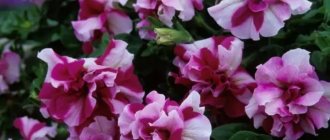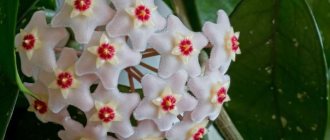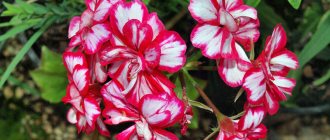Zamioculcas zamiifolia is a unique species found in Mozambique and Madagascar. This is a large herbaceous plant with shiny leaves. In addition to its scientific name, it is called the “dollar tree.” According to legend, the plant attracts material wealth to the home, so it is used to decorate offices and banks. The crop has many varieties, differing in the height of the bush, shape or color of the leaves. One of the most spectacular varieties is Zamioculcas black.
Detailed description
Black Zamioculcas (Zamioculcas Black Raven) is also known as Zamioculcas Black Prince, Black Raven, Raven (Raven) . The culture received its last name for the similarity of the shape and color of the leaves with a raven’s wing.
The height of an adult plant is 75 cm. The leaves are ovoid, glossy, complex pinnate, grow from a fleshy tuber located underground. The leaves have a swollen thickening at the bottom. The appearance of the plant looks unnatural: the leaves are so dark that they appear black. The plant acquires such a beautiful color as it matures. In young specimens (up to a year), all their parts have a soft light green color.
The flower grows slowly: per year - only 10-15 cm.
Attention! The plant has no stems! Zamioculcas leaves have long, thick petioles that are mistaken for stems.
Black zamioculcas (Zamioculcas Blaсk Raven) - what kind of flower is it
Among the few species of the plant, there is a variety with black leaves. Why did the flower get the name Zamioculcas Black? The flower received the nickname “Raven” for the similarity of the stem with the straightened feather of a crow. Zamioculcas Raven is also called the dollar tree.
Zamioculcas black - a rare species of the family
Short description
This is a powerful bush up to 1.5 m in height with straight fleshy branches, on which oval leaves are located in the same plane on both sides. On new shoots the foliage is light green, but over time it turns black. Thanks to the mixture of young light shoots and mature dark ones, the black dollar tree looks especially impressive in the interior.
Breeders have bred a miniature species - Zamioculcas Zenzi; the description says that it is a shrub up to 60 cm high with black leaves.
For your information! The key difference between Zamioculcas Raven and other varieties is its black leaves.
Photo of this variety of dollar tree
Below you can see what the plant looks like:
General information
Zamioculcas Zenzi is an evergreen plant growing up to 80 cm in height. This is a Dutch variety originating from an African plant (zamioculcas), which is increasingly gaining popularity in Russia due to its unusual appearance and bright color. This succulent has a small tuber and a massive leaf, the base of which resembles the trunk of a flower. There the plant stores moisture.
Flowering in such an unusual indoor plant is an infrequent occurrence, or rather it blooms once every 5 years and with proper care.
For example, Zamioculcas decorum or decorum flower blooms with large, bright flowers. Their flowers are represented by cobs (spikes) similar to the flowering of Dieffenbachia and Ficus, as well as some smaller flowers.
It will not be difficult for you to grow it if you do everything correctly.
Bloom
Zamioculcas black will please its owner with flowering only with very good care. The Black Crow blooms very rarely under ideal conditions - once every 3-5 years .
When and how does it bloom?
Flowers appear at the end of winter - in February. The inflorescence is a complex spadix of creamy green color, surrounded by a greenish spathe. The length of the inflorescence together with the short peduncle varies from 7 to 20 cm.
What do the fruits look like?
The Zamioculcas inflorescence has an interesting structure: female flowers are located at the bottom of the spadix, followed by a zone of sterile flowers, and male flowers are located in its upper part. In nature, the plant is pollinated by small insects and wind . The fruit is a brown multi-seeded berry. It does not ripen at home.
General characteristics of the plant
Zamioculcas is an evergreen succulent with beautiful fleshy leaves.
Zamioculcas belongs to herbaceous plants of the Arronica family. This category includes spathiphyllum, callas, philodendrons and others.
The main feature that allows you to easily distinguish Zamioculcas from other plants is the presence of many complex pinnate leaves located on the tuber . They have a rich green color and are slightly glossy. During flowering, a small cream-colored cob , covered with a light green petal.
Landing technology
After purchase, the plant is placed away from the crops available in the house. Such quarantine is necessary to acclimatize the flower and identify possible pests. After 5 days they begin planting.
Choosing a pot
Choose a pot 1-2 sizes larger than the root ball. The ideal option is a ceramic pot, narrowed at the bottom, with a drainage hole.
What should the soil be like?
To prepare the substrate yourself, take (ratio in parts):
- peat – 2 hours;
- sand – 1 hour;
- humus – 1 hour;
- fine expanded clay – 1 tsp.
If it is not possible to prepare soil for a succulent, buy it at the store. For Zamioculcas, a cactus mixture is suitable.
How to plant?
Planting technology is simple:
- Remove the flower from the pot and shake off excess soil.
- Coarse expanded clay is poured onto the bottom of the new container.
- On top is a layer of soil on which the plant is placed, straightening the roots.
- The roots are covered with soil so as not to bury the plant.
After planting, the flower is watered and the drained water is drained from the pan.
Reproduction methods
Seeds
It is almost impossible to purchase Zamioculcas "Raven" seeds. If this is successful, then sow the seeds in a damp soil mixture for succulents at a distance of a couple of centimeters and cover with film.
Ventilate the plantings once a day and regularly ensure that the substrate does not dry out. Seating is done after the appearance of two leaves, which will have to wait at least two to three months.
Cuttings
The simplest and most effective way. The stem located above the soil is cut and cut between the leaves. The wounds dry in the air. Next, the cuttings are planted in soil poured into a flat container.
The plant can be propagated by cuttings
The ground is moistened abundantly by spraying, and the seedlings are covered with plastic cups.
Before rooting, the shoots continue to be kept at a temperature of at least 20⁰C in sufficient diffused lighting, sometimes ventilated and promptly sprayed with a spray bottle.
Dividing an adult plant
When transplanting is carried out, the stem-tuber of the overgrown plant is divided, and each part is planted in a new container. Care is then carried out as for an adult specimen.
Leaves
The slowest way: place a broken leaf in water and wait for roots to appear. After six months or a year, a tuber appears, after which planting can be done using the usual method. To stimulate the process, special preparations are used that activate the formation of the root system.
Rooting can be done directly into the substrate if you place the leaf in a mini-greenhouse and spray it regularly.
Home care
Unlike other varieties and hybrids, black zamioculcas is not only distinguished by its spectacular appearance, but also by its absolute unpretentiousness to growing conditions.
Temperature
Throughout the entire season, the plant enjoys a comfortable temperature within 18-22°C.
Lighting
This variety is afraid of direct sunlight . If the room's windows face the sunny side, place the flower pot deep into the room. Then the incident light will be diffused and will not cause harm to the pet.
Reference! Light intensity does not affect the brightness of leaf color. Even if the flower is in the shade, it will have a rich black color.
Watering
Like other varieties and hybrids of Zamioculcas, “Black Crow” is a succulent.
This means that the crop is able to accumulate water inside storage tubers, leaves, stems, and then consume it.
The main rule of watering is moderation . It is almost impossible to dry the plant.
Watering is carried out with settled water at room temperature. After watering, the water is drained from the pan.
Top dressing
During the growth of new leaves, in March, the first fertilizing with complex fertilizer for indoor plants begins.
Trimming
As zamioculcas grows, the leaves naturally die off. To prevent the bush from losing its decorative appearance, they are cut with a sharp knife, leaving a small stump (2-3 cm) above the ground. The cut area is sprinkled with crushed coal.
For large trees, formative pruning is carried out in the spring, cutting out heavy leaves along the edges, giving the crown neatness. The cut leaves are used as propagation material.
Transfer
Young plants are replanted annually, large plants - once every 3-5 years . The fact that Zamioculcas needs replanting is indicated by the roots emerging from the drainage hole. For transplantation, select a pot with a diameter one size larger than the previous one. The best time for transshipment is spring.
If the transplant is unscheduled (in case of illness), it is performed in any season. Shake off all the soil from the roots, cutting off the rotten ones.
Care during the flowering period
The plant blooms inconspicuously , so it does not require any care to maintain flowering. After flowering, the flower stalks are cut off, and the cut points are sprinkled with charcoal powder.
What to do if it doesn't bloom?
Black zamioculcas rarely blooms even in ideal conditions. There is a sign that if zamioculcas blooms in the house, there will be some kind of happy event (wedding, news of pregnancy, material luck). You can stimulate the flowering of the plant by placing it on a bright eastern window.
Trimming
Dollar tree or zamioculcas - flower of celibacy
To form the crown, the plant is pruned. The procedure is best carried out in the spring and summer. Use a small sharp tool to remove damaged, dry stems, yellowed leaves, and shoots with a large number of leaves.
You cannot cut shoots close to the rhizome; it is better to leave a small stump. The sections need to be treated with an antimicrobial agent, the best option is activated carbon powder.
Regular pruning is also necessary to ensure that the flower does not waste nutrients on unnecessary or damaged leaves.
Diseases and pests
The plant can become sick due to improper watering. If there is excess moisture, the roots will rot and if measures are not taken in time, the zamioculcas will die.
Dangerous pests for crops:
- scale insect;
- mealybug;
- spider mite;
- aphid.
If any insect is found, treat the bush with Fitoverm (10 ml/1 l of water).
Zamioculcas Black Raven will become an accent in any interior. The advantage of this variety is that it is unpretentious and loves shaded areas. Such a gift will please not only the experienced plant collector, but also the beginner.
Unpleasant phenomena - what to do?
A flowering dollar tree is a wonderful addition to your home decor, even if there are no buds on it. Fleshy leaves filled with moisture attract the eye and delight the heart. The flower is unpretentious and quite hardy to unfavorable conditions. But still, he is not immune from diseases, the main cause of which is inept care of the plant.
Often the dollar tree turns yellow, which worries its fans. Fortunately, this phenomenon is not always caused by a disease. Since the flower grows very slowly, the old leaves first turn yellow and then die. In their place, new ones appear, which indicates the normal process of development of Zamioculcas. If this does not happen, the reason may be due to the following factors:
- insufficient watering;
- draft;
- sudden change in temperature;
- the appearance of pests.
In this case, it is advisable to take action and eliminate the main problem of the flower’s suffering. And then the magnificent dollar tree can become the calling card of a home where love and kindness flourish.











